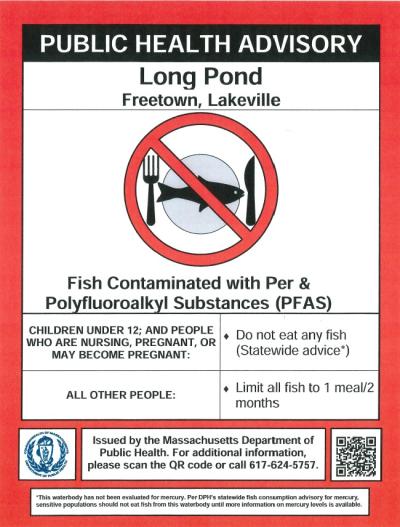PFAS levels make fish in Long Pond unsafe to eat
LAKEVILLE – A public health advisory has been issued warning residents to limit or avoid consuming fish from Long Pond.
The advisory was issued by the Massachusetts Department of Public Health after elevated levels of the PFAS chemicals were found in fish samples from the pond, which stretches across Lakeville and Freetown.
Traces of PFAS in fish samples exceeded the state limit of 0.22 parts per billion, according to the Massachusetts Department of Environmental Protection. The advisory was posted on the Lakeville town website on Tuesday, June 18.
The Fish Consumption Advisory states that most people should limit consumption of fish from Long Pond to one meal every two months. Children and women who are nursing, pregnant or could become pregnant should not consume fish at all.
PFAS, or perfluoroalkyl and polyfluoroalkyl substances, are man-made chemicals that have been used in the manufacturing of certain fire-fighting foams, moisture and stain-resistant products and other industrial processes.
Fish Consumption Advisories have been posted at the Long Pond Boat ramp in East Freetown and at the Clark Shores Boat ramp to inform residents, said Lakeville Board of Health Agent Edward Cullen.
The public health advisory does not ban people from eating the fish, Cullen explained.
“It’s similar to what they put on cigarettes. No one is going to be arrested if they eat or catch the fish, you can catch and eat as much as you want, just like you can smoke 10 packs a day if you want,” but the state wouldn’t recommend it, he said.
PFAS are called “forever” chemicals because they accumulate over time in your body, said Cullen.
This is what makes them especially dangerous to children and women who are pregnant, nursing or may become pregnant, he noted.
High levels of PFAS in one’s blood can lead to many adverse health effects such as cancer, according to the Massachusetts Department of Public Health.
Cullen anticipates that the public health advisory will be in effect for a while. “We’re not stopping using PFAS so I don’t see the levels going down,” he said.











